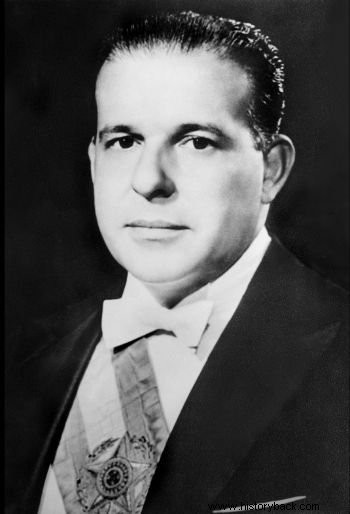João Goulart or Jango , as he became known, was the twenty-fourth President of the Republic of Brazil .
He assumed the presidency of the country, with the resignation of Jânio Quadros , ruling Brazil from 1961 to 1964.
Biography of João Goulart
João Belchior Marques Goulart was born at the Estancia de Iguariaçá, in São Borja, Rio Grande do Sul, on March 1, 1919.
A descendant of a wealthy gaucho family, his father, Vicente Rodrigues Goulart, was a colonel and his mother, Vicentina Marques Goulart, was the owner of the home.
João was the oldest of eight siblings, and spent his childhood in São Borja. He studied at Colégio das Irmãs Teresianas, in a town close to his hometown, Itaqui. He went to study at Internato Santana, in Uruguaiana, and later, at Colégio Anchieta, in Porto Alegre.
In the capital, he studied Law at the Faculty of Porto Alegre and had a great political presence, alongside his companion Getúlio Vargas.
He died in Mercedes, in the Province of Corrientes, Argentina, on December 6, 1976, when he was in exile, after being deposed by the Military Coup of 1964.
João Goulart's government
He began his political career in 1946, with the founding of the Partido Trabalhista Brasileiro (PTB), of which he was national president between 1952 and 1964.
In 1947, he was elected State Deputy to the Legislative Assembly of Rio Grande do Sul. In 1950, he was elected Federal Deputy, with about 40 thousand votes, being the first position that consecrated him in politics, with the help of his friend and fellow countryman Getúlio Vargas (1882-1954) who governed Brazil from 1930 to 1945.
Furthermore, in the second Getúlio government, João Goulart held the post of Minister of Labour, Industry and Commerce from 1953 to 1954.
Note that João Goulart won two elections as vice president of the Republic. First, he was elected vice-president of Juscelino Kubitschek, in 1955, and later, vice-president of Jânio Quadros, in 1960.
He assumed the presidency on September 7, 1961, with the resignation of Jânio Quadros, in August 1961. The military and the UDN (National Democratic Union), however, were against his ascension to the presidency.
On the other hand, Jango had great support from popular layers such as the working class, unions and students. When he assumes the presidency, the country was in disarray, marked by political and economic crises.
Thus, Jango intended to transform the country, renewing the constitution and, above all, proposing basic reforms in the educational, fiscal, political and agrarian sectors, such as agrarian reform, tax reform, electoral reform (with the vote for the illiterate), the university reform, among others.
His actions were controversial, so that the country, in 1963, reached a sky-high level of foreign debt and inflation, approaching 74%.
1964 coup
Occurred on March 31, 1964, the opponents of Jango's government (military and conservative politicians) staged a coup that became known as the "Coup of 64".

This action was intended, among other things, to depose President João Goulart, accused of being a communist. Once the military took power, Jango took refuge in Uruguay and would die in exile.
To learn more:
- Military Coup of 1964
- Era Vargas
- Communism
- Carlos Lacerda
